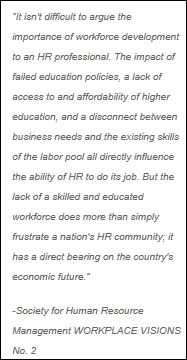Workforce Readiness
If Not Us… Who? If Not Now… When?
Volunteer with the COSHRM
Workforce Readiness Initiative
Make a difference in your community today!
What is workforce readiness?
Workforce readiness has two sides:
First, is ensuring new and returning workplace entrants are prepared to enter the workforce with the requisite knowledge, skills, and abilities required to succeed in the workplace.
Second is to ensure that the workplaces are productive by welcoming the new workforce.
Partnerships and alliances between educational institutions, governmental entities, non-profits and employers can assist in ensuring that our new workforce entrants are sufficiently prepared to meet the challenges and opportunities they face in the workplace.
Why are HR professionals the key to workforce readiness success?
HR professionals are uniquely suited to address many of the challenges raised by workforce readiness issues. HR professionals can play a critical role in helping employers formulate hiring criteria.
Additionally, the HR community can take the lead in coalition building to develop rigorous real world training, which can be shared throughout the business community and serve as a basis for development programs.
Finally, HR professionals can bring their quantitative skills to help develop programs to improve workforce readiness and to evaluate models and pilot programs to ensure their effectiveness and adaptability in meeting current needs and their ability to anticipate future needs.
Join COSHRM (the six Colorado SHRM Chapters), in supporting workforce readiness as a critical initiative for the health and well-being of Colorado.
What barriers are we attempting to overcome?
Where will HR professionals find the talent their organizations need now and in the future? We all know there are plenty of applicants, but finding qualified applicants with the right skills is a challenge. COSHRM is addressing the talent gap in our communities through the Workforce Readiness Initiative.
Students need to stay in school and get that diploma. But today, a high school diploma is the minimum we expect. We need to encourage everyone to pursue post-secondary work.
People with disabilities, returning veterans, people with criminal records, and the long term unemployed all face barriers when entering or reentering the workforce.




